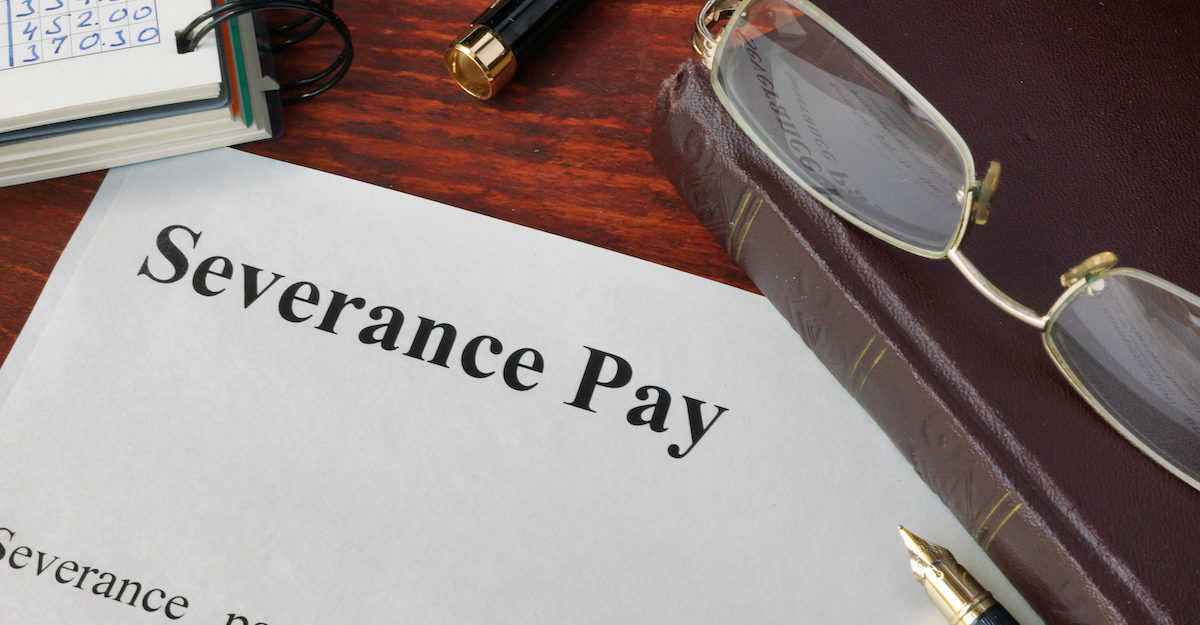Severance Pay and Tax in Ontario: What You Need to Know

Severance pay can be a financial lifeline after a job loss or termination without cause — but how much of it do you actually get to keep? Many non-unionized employees in Ontario are surprised to learn that severance is often taxed, and the rules can be confusing.
This guide breaks down what taxes apply to severance pay, how deductions work, and what you can do to reduce the amount lost to taxes.
What’s in This Guide
👉 Click to Expand
- Is Severance Pay Taxable in Ontario?
- How Is Severance Pay Taxed?
- Is Severance Subject to CPP and EI?
- How Much Tax Is Deducted From Severance?
- Taxes on Lump-Sum Severance Payments
- Can Severance Be Transferred to an RRSP?
- How to Reduce or Avoid Tax on Severance
- FAQs
- When to Speak to an Employment Lawyer
Is Severance Pay Taxable in Ontario?
Yes, severance pay is considered taxable income in Ontario. Whether you receive your severance in a lump sum or as salary continuance, it will be subject to income tax under the Income Tax Act.
Many employees assume severance is “extra” or untaxed — but that’s not the case. Like regular employment income, it must be reported on your tax return and will affect your overall taxable income for the year.
🔎 Quick tip: Even if your employer withholds tax when issuing your severance, you may still owe more (or less) come tax season depending on your total annual income.
How Is Severance Pay Taxed?
Severance pay is taxed differently depending on how it’s delivered — as a lump-sum payment or through salary continuance.
If It’s a Lump Sum:
- Your employer will apply a withholding tax based on the total amount of the payment (see rates below). This tax is deducted at source, and you’ll receive the remainder.
If It’s Salary Continuance:
- You continue to receive regular paycheques for a defined period, and taxes are deducted just like they were while you were working.
⚠️ Important: The withholding tax may not reflect your actual tax rate. You could owe more — or get a refund — after filing your tax return.
Is Severance Pay Subject to CPP and EI?
No. Severance pay is not subject to CPP (Canada Pension Plan) or EI (Employment Insurance) deductions in Ontario or anywhere else in Canada.
That’s because severance isn’t considered “insurable” employment income — it’s a form of compensation for ending the employment relationship, not payment for ongoing work.
✅ Bottom line: You’ll see income tax deducted from your severance, but not CPP or EI.
How Much Tax is Deducted From Severance?
If you receive your severance pay as a lump sum, your employer will deduct a flat percentage based on the total amount — this is called withholding tax.
Federal Withholding Rates in Ontario:
- Up to $5,000: 10% withheld
- $5,001 to $15,000: 20% withheld
- Over $15,000: 30% withheld
These are not your final tax rates — they’re just upfront deductions. The actual amount you owe (or get back) depends on your total income for the year when you file your tax return.
📌 Tip: If you’re in a higher tax bracket, you may owe more. If you’re in a lower bracket, you could get a refund.
Taxes on Lump-Sum Severance Payments
A lump-sum severance is a one-time payment made by your employer after termination. Because it’s paid all at once — and not spread over time — it’s taxed differently from regular income.
How It’s Taxed:
- Withholding tax is applied upfront, based on the size of the payment (10%, 20%, or 30%).
- You’ll receive the net amount after this deduction.
- The actual tax liability will be calculated when you file your annual return — and may be higher or lower depending on your total income and deductions.
💡 Example: If you’re paid $25,000 in severance, your employer will likely deduct 30% ($7,500) and issue you $17,500. But your actual tax owed may differ.
Can Severance Pay Be Transferred to an RRSP?
Yes — and this is one of the most effective ways to reduce or defer taxes on your severance pay.
If you have enough contribution room in your RRSP, you can transfer part or all of your severance directly into the account. Doing this allows you to avoid withholding tax and defer income tax until you withdraw the funds later in life.
This type of transfer is sometimes called a “retiring allowance.”
Two Ways to Transfer Severance to Your RRSP:
- Direct transfer: Your employer deposits the amount directly into your RRSP — no tax is withheld.
- Indirect transfer: You receive the severance, then contribute to your RRSP yourself (you’ll still get a deduction, but tax may be withheld upfront).
How to Reduce or Avoid Tax on Severance
While you can’t completely avoid tax on severance pay in most cases, there are legal ways to reduce the amount you owe — especially with proper planning.
4 Common Strategies:
- Transfer severance to an RRSP: If you have enough contribution room, a direct transfer avoids upfront tax entirely.
- Split payments across tax years: Ask if your severance can be paid in two parts — one this year, one next. This may help keep you in a lower tax bracket.
- Take salary continuance: If offered, this spreads out the income and keeps your monthly tax rate lower.
- Work with a tax professional: A tax advisor can help you structure the payment in the most tax-efficient way possible.
🔴 Important: This article is for informational purposes only and is not intended as tax advice. Severance taxation can be complex and depends on your personal situation. Speak to a qualified tax advisor or accountant before making any decisions about your severance payout.
✅ Bonus tip: Make sure the severance package itself is fair before focusing on tax. Many employees settle for less than they’re legally owed. Find out what you’re owed — use the Ontario Severance Pay Calculator.
FAQs About Severance Pay and Tax in Ontario
✅ Does Severance Pay Get Taxed in Ontario?
Yes. Severance pay is considered taxable income and will have income tax withheld, either at a flat rate or through payroll if paid as salary continuance.
✅ Can I Avoid Paying Tax on Severance Pay?
You may be able to reduce or defer taxes by transferring your severance into an RRSP — especially if it qualifies as a retiring allowance and you have available contribution room.
✅ Do I Have to Pay CPP or EI on Severance?
No. Severance pay is not subject to CPP or EI deductions, because it’s not treated as insurable income.
✅ Is Severance Pay Considered Income For Tax Purposes?
Yes. It counts as employment income and must be reported on your tax return for the year in which it was received.
✅ Can Severance Be Split Into Multiple Payments to Lower Taxes?
Possibly. Some employers may agree to divide the payout over two tax years or structure it as salary continuance, which can help reduce your effective tax rate.
When to Speak to an Employment Lawyer
Before worrying about taxes, make sure the severance package itself is fair. Many non-unionized employees in Ontario are offered far less than they’re legally entitled to.
You are owed up to 24 months’ pay, depending on your age, position, length of service, and how difficult it may be for you to find new work. Our guide to severance pay in Ontario explains what you’re legally owed — and what to do if your employer doesn’t offer enough.
At Samfiru Tumarkin LLP, we’ve helped over 50,000 non-unionized employees across Ontario and Canada recover the full compensation they’re owed — and we’ll make sure your severance is calculated properly before tax is even considered.
- 👥 Over 50,000 clients helped across Canada
- 💰 Millions recovered in severance and compensation
- ⚖️ No win, no fee — you don’t pay unless we win*
- ⭐ 2,283 5-star Google reviews across Ontario (4.8 average)
- 🏆 Recognized as one of Canada’s Best Law Firms by The Globe and Mail
* Conditions apply. Not all cases qualify.
Contact us now to find out what you’re owed. Book your consultation or call 1-855-821-5900.
⚠️ UNIONIZED?
You must consult your union representative regarding termination, severance pay, and other workplace issues. By law, employment lawyers can’t represent unionized employees with these issues. You’re governed by your collective bargaining agreement.




